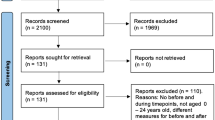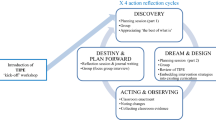Abstract
Children ages birth to five experience trauma at high rates. Additionally, children with disabilities are more likely to experience trauma than children without disabilities, highlighting the need for early childhood education (ECE) settings and professionals to be prepared to support children with disabilities who have experienced trauma. In this scoping literature review, we sought to explore the current knowledge base on trauma-informed care in ECE settings to identify what is known and potential gaps in the literature. We found 20 articles that discuss trauma-informed care in ECE settings and summarize the key findings from the literature, including that few studies have focused on children with disabilities. We describe several implications for research related to trauma-informed care.

Similar content being viewed by others
References
Arata, C. M., Langhinrichsen-Rohling, J., Bowers, D., & O’Farrill-Swails, L. (2005). Single versus multi-type maltreatment: An examination of the long-term effects of child abuse. Journal of Aggression, Maltreatment & Trauma, 11(4), 29–52. https://doi.org/10.1300/J146v11n04_02
Avery, J. C., Morris, H., Galvin, E., Misso, M., Savaglio, M., & Skouteris, H. (2021). Systematic review of school-wide trauma-informed approaches. Journal of Child & Adolescent Trauma, 14,, 381-397. https://doi.org/10.1007/s40653-020-00321-1
Bailey, B. A. (2011). The theoretical and scientific basis of Conscious Discipline®. https://consciousdiscipline.com
*Bartlett, J. D., & Smith, S. (2019). The role of early care and education in addressing early childhood trauma. American Journal of Community Psychology, 64(3–4), 359–372. https://doi.org/10.1002/ajcp.12380
*Chudzik, M., Corr, C., & Wolowiec-Fisher, K. (2022). Trauma: early childhood special education teachers’ attitudes and experiences. Early Childhood Education Journal. https://doi.org/10.1007/s10643-021-01302-1
Cole S. F., Eisner, A., Gregory, M., & Ristuccia, J. (2013). Creating and advocating for trauma-sensitive schools. Massachusetts Advocates for Children. http://www.traumasensitiveschools.com
Corr, C., Snodgrass, M. R., Love, H., Scott, I. M., Kim, J., & Andrews, L. (2021). Exploring the landscape of published mixed methods research in special education: A systematic review. Remedial and Special Education, 42(5), 317–328. https://doi.org/10.1177/0741932520924030
National Association for the Education of Young Children. (2020). Developmentally Appropriate Practice. [Position Statement]. https://www.naeyc.org/sites/default/files/globally-shared/downloads/PDFs/resources/position-statements/dap-statement_0.pdf
Division for Early Childhood. (2016). Child Maltreatment: A position statement of the Division for Early Childhood [Position Statement]. Retrieved from http://www.dec-sped.org/single-post/2016/10/28/DECs-Position-Statement-on-Child-Maltreatment—Taking-a-Stand
*Douglass, A., Chickerella, R., & Maroney, M. (2021). Becoming trauma-informed: A case study of early educator professional development and organizational change. Journal of Early Childhood Teacher Education, 42(2), 182–202. https://doi.org/10.1080/10901027.2021.1918296
Dube, S. R., Felitti, V. J., Dong, M., Chapman, D. P., Giles, W. H., & Anda, R. F. (2003). Childhood abuse, neglect, and household dysfunction and the risk of illicit drug use: The adverse childhood experiences study. Pediatrics, 111(3), 564–572. https://doi.org/10.1542/peds.111.3.564
*DuBois, A. L. (2010). An inquiry of the lived experiences and contextual understandings of early childhood special educators related to children’s trauma. (Publication No. 3427789). [Doctoral dissertation, Duquesne University]. ProQuest Dissertations Publishing.
Eigsti, I., & Cicchetti, D. (2004). The impact of child maltreatment on expressive syntax at 60 months. Developmental Science, 7(1), 88–102. https://doi.org/10.1111/j.1467-7687.2004.00325.x
Elo, S., & Kyngäs, H. (2008). The qualitative content analysis process. Journal of Advanced Nursing, 62(1), 107-115. https://doi.org/10.1111/j.1365-2648.2007.04569.x
Felitti, V. J., Anda, R. F., Nordenberg, D., Williamson, D. F., Spitz, A. M., Edwards, V., Moss, M. P., & Marks, J. S. (1998). Relationship of childhood abuse and household dysfunction to many of the leading causes of death in adults. American Journal of Preventive Medicine, 14, 245–258. https://doi.org/10.1016/S0749-3797(98)00017-8
Hemmeter, M. L., Ostrosky, M. M., & Fox, L. (2021). Unpacking the Pyramid Model. Brookes Publishing.
*Holmes, C., Levy, M., Smith, A., Pinne, S., & Neese, P. (2015). A model for creating a supportive trauma-informed culture for children in preschool settings. Journal of Child and Family Studies, 24(6), 1650–1659. https://doi.org/10.1007/s10826-014-9968-6
Jimenez, M. E., Wade, R., Lin, Y., Morrow, L. M., & Reichman, N. E. (2016). Adverse experiences in early childhood and kindergarten outcomes. Pediatrics, 137(2), 1–11. https://doi.org/10.1542/peds.2015-1839
Jones, L., Bellis, M. A., Wood, S., Hughes, K., McCoy, E., Eckley, L., & Ofcer, A. (2012). Prevalence and risk of violence against children with disabilities: A systematic review and meta-analysis of observational studies. Lancet, 380, 899–907. https://doi.org/10.1016/s0140-6736(12)60692-8
Larson, S. A., & Anderson, L. (2006). Children with disabilities and the child welfare system: Prevalence data. Impact Feature Issue on Children with Disabilities in the Child Welfare System, 19(1), 6–7.
*Lombardi, C. (2019). Early childhood teacher perspectives regarding preparedness to teach children experiencing trauma. (Publication No. 27672548). [Doctoral dissertation, Walden University]. ProQuest Dissertations Publishing.
*Loomis, A. (2018). The role of preschool as a point of intervention and prevention for trauma-exposed children: Recommendations for practice, policy, and research. Topics in Early Childhood Special Education, 38(3), 134-145. https://doi.org/10.1177/0271121418789254
*Loomis, A. M., & Felt, F. (2021). Knowledge, skills, and self-reflection: Linking trauma training content to trauma-informed attitudes and stress in preschool teachers and staff. School Mental Health, 13, 101–113. https://doi.org/10.1007/s12310-020-09394-7
*Lipscomb, S. T., Hatfield, B., Lewis, H., Goka-Dubose, E., & Fisher, P. A. (2019). Strengthening children’s roots of resilience: Trauma-responsive early learning. Children and Youth Services Review, 107, 104510. https://doi.org/10.1016/j.childyouth.2019.104510
*Martin, C. P., Russo, J., Goldenthal, H., Holley, C., Gouze, K. R., & Williford, A. (2021). Supporting young children exposed to potentially traumatic events: Implications for early care and education policy. Policy Insights from the Behavioral and Brain Sciences, 8(2), 119–126. https://doi.org/10.1177/23727322211033880
McDermott, B., Berry, H., & Cobham, V. (2012). Social connectedness: A potential aetiological factor in the development of child post-traumatic stress disorder. Australian and New Zealand Journal of Psychiatry, 46(2), 109–117. https://doi.org/10.1177/0004867411433950
Mersky, J. P., Topitzes, J., & Reynolds, A. J. (2013). Impacts of adverse childhood experiences on health, mental health, and substance use in early adulthood: A cohort study of an urban, minority sample in the U.S. Child Abuse and Neglect, 37, 917–925. https://doi.org/10.1016/j.chiabu.2013.07.011
Miller, D., & Santos, R. M. (2020). The characteristics among maltreatment, special education service delivery, and personnel preparation. The Journal of Special Education, 53(4), 216-225. https://doi.org/10.1177/0022466919836278
Moher, D., Liberati, A., Tetzlaff, J., Altman, D. G., PRISMA Group. (2009). Preferred reporting items for systematic reviews and meta-analyses: The PRISMA statement. Annals of Internal Medicine, 151(4), 264–269. https://doi.org/10.7326/0003-4819-151-4-200908180-00135
*Montgomery, J. (2020). Trauma-informed care: The perceptions of Head Start teachers. (Publication No. 28001681). [Doctoral dissertation, California State University]. ProQuest Dissertations Publishing.
*Mortensen, J. A., & Barnett, M. A. (2016). The role of child care in supporting the emotion regulatory needs of maltreated infants and toddlers. Children and Youth Services Review, 64, 73–81. https://doi.org/10.1016/j.childyouth.2016.03.004
National Child Traumatic Stress Network, Schools Committee. (2017). Creating, supporting, and sustaining trauma-informed schools: A system framework. Los Angeles, CA, and Durham, NC: National Center for Child Traumatic Stress.
*Pantry, J. S. (2020). Trauma-informed teacher preparedness in early childhood programs serving students from low-income families exposed to adverse traumatic experiences: A qualitative phenomenological study. (Publication No. 28258945). [Doctoral dissertation, Northcentral University]. ProQuest Dissertations Publishing.
Pears, K., Fisher, P., Bruce, J., Kim, H., & Yoerger, K. (2010). Early elementary school adjustment of maltreated children in foster care: The roles of inhibitory control and caregiver involvement. Child Development, 81(5), 1550–1564. https://doi.org/10.1111/j.1467-8624.2010.01491.x
*Pusakulich, A. L. (2020). The perceptions of early childhood professionals regarding identifications of developmental trauma and training needs in trauma informed practices: a qualitative case study. (Publication No. 28090115). [Doctoral dissertation, Northcentral University]. ProQuest Dissertations Publishing.
*Reynaga, J. (2020). Creating a trauma-informed early childhood workforce in Los Angeles County: Understanding the self-reported impact of a TIC training program. (Publication No. 28094539). [Doctoral dissertation, University of Southern California]. ProQuest Dissertations Publishing.
*Saint Gilles, M. P. (2016). A pilot study of the effects of a trauma supplement intervention on agency attitudes, classroom climate, head start teacher practices, and student trauma-related symptomology. (Publication No. 10244457). [Doctoral dissertation, Michigan State University]. ProQuest Dissertations Publishing.
Saldaña, J. (2021). The coding manual for qualitative researchers (4th ed.). SAGE.
*Sciaraffa, M. A., Zeanah, P. D., & Zeanah, C. H. (2018). Understanding and promoting resilience in the context of adverse childhood experiences. Early Childhood Education Journal, 46(3), 343–353. https://doi.org/10.1007/s10643-017-0869-3
Sedlak, A. J., Mettenburg, J., Basena, M., Peta, I., McPherson, K., & Greene, A. (2010). Fourth national incidence study of child abuse and neglect (NIS-4). Washington, DC: US Department of Health and Human Services, 9, 2010.
*Stegall, E. A. (2020). Trauma-informed teaching in the early childhood classroom: Teachers’ perspectives on supporting students exposed to trauma. (Publication No. 28025814). [Doctoral dissertation, Northcentral University]. ProQuest Dissertations Publishing.
Substance Abuse and Mental Health Services Administration. (2014). SAMHSA’s concept of trauma and guidance for a trauma-informed approach. https://ncsacw.samhsa.gov/userfiles/files/SAMHSA_Trauma.pdf
Sullivan, P. M., & Knutson, J. F. (2000). Maltreatment and disabilities: A population-based epidemiological study. Child Abuse and Neglect, 24(10), 1257–1273. https://doi.org/10.1016/S0145-2134(00)00190-3
Thomas, M. S., Crosby, S., & Vanderhaar, J. (2019). Trauma-informed practices in schools across two decades: An interdisciplinary review of research. Review of Research in Education, 43(1), 422-452. https://doi.org/10.3102/0091732X18821123
van der Kolk, B. A. (2005). Developmental trauma disorder: Toward a rational diagnosis for children with complex trauma histories. Psychiatric Annals, 35(5), 401–408. https://doi.org/10.3928/00485713-20050501-06
VERBI Software. (2021). MAXQDA 2022 [computer software]. VERBI Software. maxqda.com.
*Waddell, P. J. (2020). Teachers’ perceptions of toxic stress and classroom practices they use with young children. (Publication No. 28262191). [Doctoral dissertation, Walden University]. ProQuest Dissertations Publishing.
Wassink-de Stigter, R., Kooijmans, R., Asselman, M. W., Offerman, E. C. P., Nelen, W., & Helmond, P. (2022). Facilitators and barriers in the implementation of trauma-informed approaches in schools: A scoping review. School Mental Health, 14(3), 470-484. https://doi.org/10.1007/s12310-021-09496-w
*Whitaker, R. C., Herman, A. N., Dearth-Wesley, T., Smith, H. G., Burnim, S. B., Myers, E. L., Saunders, A. M., & Kainz, K. (2019). Effect of a trauma-awareness course on teachers’ perceptions of conflict with preschool-aged children from low-income urban households. JAMA Network Open, 2(4), e193193. https://doi.org/10.1001/jamanetworkopen.2019.3193
Zetlin, A. (2006). The experiences of foster children and youth in special education. Journal of Intellectual and Developmental Disability, 31(3), 161–169. https://doi.org/10.1080/13668250600847039
Author information
Authors and Affiliations
Corresponding author
Additional information
Publisher's Note
Springer Nature remains neutral with regard to jurisdictional claims in published maps and institutional affiliations.
Rights and permissions
Springer Nature or its licensor (e.g. a society or other partner) holds exclusive rights to this article under a publishing agreement with the author(s) or other rightsholder(s); author self-archiving of the accepted manuscript version of this article is solely governed by the terms of such publishing agreement and applicable law.
About this article
Cite this article
Chudzik, M., Corr, C. & Santos, R.M. Trauma-Informed Care in Early Childhood Education Settings: A Scoping Literature Review. Early Childhood Educ J (2023). https://doi.org/10.1007/s10643-023-01596-3
Accepted:
Published:
DOI: https://doi.org/10.1007/s10643-023-01596-3




